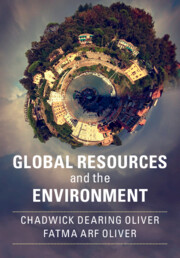Book contents
- Global Resources and the Environment
- Reviews
- Global Resources and the Environment
- Copyright page
- Dedication
- Contents
- Preface
- Acknowledgments
- Figure Credits
- Part I Introduction, Dynamic Systems, and Change
- Part II People
- Part III Climates
- Part IV Landforms
- Part V Biodiversity
- Part VI Water
- Part VII Agriculture
- Part VIII Energy
- Part IX Minerals
- Part X Forests
- Part XI Perspective
- 31 Integrating the Environment, Resources, and People
- Book part
- Index
- Plate Section
- References
31 - Integrating the Environment, Resources, and People
from Part XI - Perspective
Published online by Cambridge University Press: 05 July 2018
- Global Resources and the Environment
- Reviews
- Global Resources and the Environment
- Copyright page
- Dedication
- Contents
- Preface
- Acknowledgments
- Figure Credits
- Part I Introduction, Dynamic Systems, and Change
- Part II People
- Part III Climates
- Part IV Landforms
- Part V Biodiversity
- Part VI Water
- Part VII Agriculture
- Part VIII Energy
- Part IX Minerals
- Part X Forests
- Part XI Perspective
- 31 Integrating the Environment, Resources, and People
- Book part
- Index
- Plate Section
- References
Summary
- Type
- Chapter
- Information
- Global Resources and the Environment , pp. 485 - 491Publisher: Cambridge University PressPrint publication year: 2018



